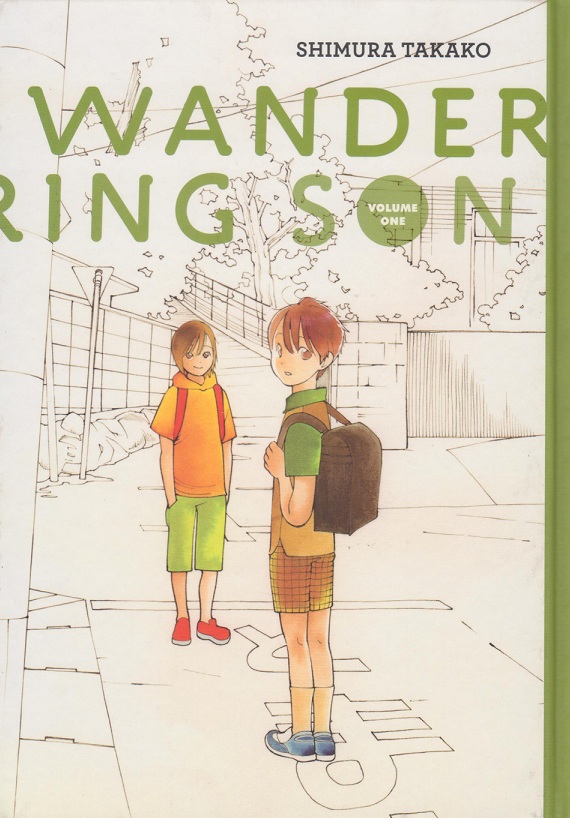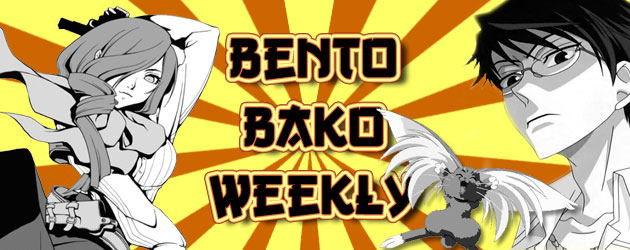 Title: Wandering Son
Title: Wandering Son
Author: Shimura Takako
Publisher: Fantagraphics Books
Volume: Volume 1 (ongoing), $19.99 (HC)
Vintage: 2002 by Enterbrain in Japan, June 2011 by Fantagraphics
Genre: Drama, slice-of-life, LGBT issues
Nitori Shuichi has just transferred schools. This delicate featured fifth grade boy is quite shy, and is often mistaken for a young girl. He ends up seated next to Takatsuki Yoshino, a handsome and friendly girl. Shuichi and Yoshino become fast friends, and one day while at Yoshino’s house, Shuichi eyes a dress hanging in his friend’s room. Noting his interest, Yoshino offers to give it to him, but an embarrassed Shuichi stutters about until Yoshino suggests he give it to his older sister, Maho. However, as they share a room, the dress remains in his sight, taunting him in a way, as Shuichi desires to wear the dress, but is too embarrassed and afraid to try. Later, at a study session at Yoshino’s house with some of the boys and girls from their class, the girls, led by Chiba Saori, begin talking about dressing Shuichi up as a girl, causing the boys to freak out and run away, leaving Shuichi to his fate. Yoshino sticks up for him, but Shuichi has already been swayed by the headband they made him wear, and goes to buy one for himself. Unfortunately, while trying on the headband and one of his sister’s dresses at home alone, Chiba shows up and catches him in the act, and her wheels start turning with ideas. First up, she suggests the class perform a play (for the graduating sixth graders) where the girls play the boy roles, and the boys play the girl roles, hoping to see Shuichi in another dress. The class decides to perform The Rose of Versailles. To prepare for her role, Yoshino gets her hair cut quite short, then decides to try a little experiment. Borrowing her father’s old school uniform, Yoshino goes into town for a bit to eat, where she is mistaken for a male and hit on by a girl. Chiba gets a little more involved in Shuichi’s business when, for his birthday, she gives him a dress and hair clips. Yoshino discovers the gift, to Shuichi’s great embarrassment, but when she admits to sometimes wearing her father’s old school uniform, Shuichi feels a bit of solidarity. Realizing that they’re sort of in the same boat, Yoshino invites Shuichi on one of her excursions, even loaning Shuichi one of her sister’s school uniforms. Unfortunately, Yoshino starts her very first period while they’re out, an absolute and continual reminder of her gender. Already mortified, the situation isn’t helped when some of the boys in her class begin to give her a hard time over it, a bit of tension that soon boils over into some bruises and a bloody nose.
This is a very gentle, subtle series, so subtle it can get a little confusing from time to time. Some of the characters are difficult to read. Takatsuki Yoshino is probably the easiest to follow, while Chiba Saori is one of the more difficult characters. The main character, Nitori Shuichi, isn’t quite grabbing me. He’s quite lost, which is the point, but I personally find Yoshino more interesting. Yoshino has a better grip on things, though I’ve no doubt that Shuichi’s journey of discovery will prove interesting. Maybe I just can’t relate very well with him? As a female, I can certainly resonate better with Yoshino’s introduction to puberty, though it’s certainly heartbreaking for her, where as it was just annoying and embarrassing for me. For Yoshino, her menstrual cycle is going to be a constant reminder that she isfemale, and that she can’t change that no matter how much she may want to (well, not without taking drastic surgical measures). Shuichi once laments, when he witnesses Yoshino getting her hair cut very short, that girls are lucky because they can “go either way.” Well, sure, no one is much bothered whether a girl has long hair or short, but that’s all on the outside. Though, on a personal note, when I was in elementary school, my hair was cut very short, and I was mistaken for a boy; I was not thrilled. Yoshino would probably be ecstatic (in fact, she is in the story when that happens). At any rate, gender identity issues aren’t really my area of expertise, and I don’t have much literary experience with them; the story may hit home much more for someone with a more personal emotional investment. As for Chiba…I’m having a hard time grasping her character. For a while I thought she might have a crush on Shuichi, but then she starts trying to dress him up as a girl. Does she understand him before he understands himself? Latching onto something Shuichi hasn’t quite come to terms with yet, but has somehow already accepted about him? I don’t think she’s just messing with him; she doesn’t seem like that kind of person. After listening to a Manga Out Loud podcast, I considered that maybe she is trying to encourage him to be different, because she feels different and understands the struggle. Yet, toward the end of the volume, she decides to try Christianity, of all things, feeling filled with guilt over the things she has done (specifically noting what she’s done to Shuichi). As an an American, that opens up a whole other slew of questions about her motivations. However, from a Japanese stand point…. I haven’t studied a lot about religion in Japan, but I do know that Christians are the odd ones out over there. And I don’t think it’s practiced the same way over there. For instance, a very conservative Christian in America would likely act very differently toward Shuichi, judging him or ostracizing him. Chiba isn’t at all like that. I simply don’t have a good grasp of her yet, but I hope she fleshes out in future volumes, just as I hope the other characters do. I certainly look forward to watching them grow.
Thanks to well known translator Matt Thorn, this volume is a very smooth read. I don’t often comment on such things, but Thorn took great care in interpreting and presenting this book, and it pays off in a very pleasing flow of text. The art is also quite lovely, very simplistic, and flows well from panel to panel. The color pages in the beginning have a beautiful, water color look to them. Fantagraphics has put out a gorgeous hardcover book with Wandering Son.
Kris
kristin@comicattack.net
@girlg33k_kris


Thank you for the kind words.
Christianity in Japan has grown largely from a 19th century progressive, humanitarian form of missionary work. Christians have been at the cutting edge of human rights movements in Japan for more than a century. Most Japanese Christians would be puzzled and shocked by modern American Christian evangelical conservatives. There’s simply no equivalent in Japan. Saori’s desire to do penitence is certainly not associated with any sort of social conservatism, so there’s no need to worry about her suddenly going all “pray away the gay” on us.
Matt, thanks for taking the time to read and comment! I appreciate your insight. I didn’t think we’d have to worry about Chiba “praying the gay away.” She seems either…accepting or, at the very least, intrigued by Shuichi. It’s great to hear that Christians in Japan are actually BEING Christians, supporting human rights. But of course, as I mentioned, that’s why it confused me a bit, since the vocal American Christians would react completely opposite.
Pingback: Happy Yaoi Day! « MangaBlog
Pingback: Bento Bako Bonus: Wandering Son volume 2